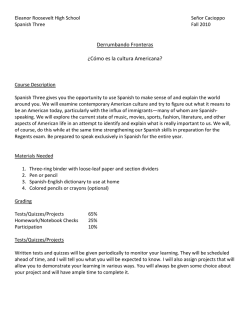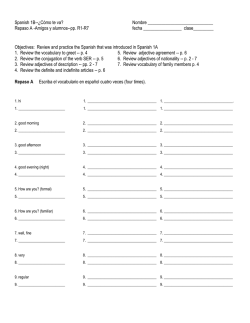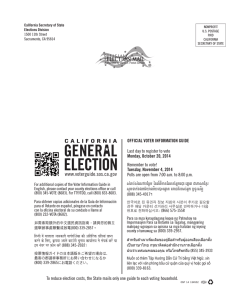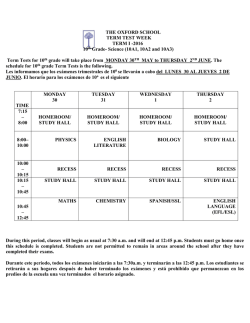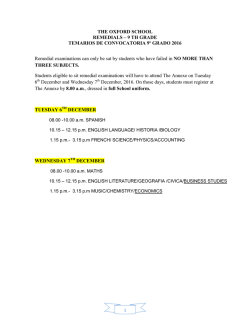
SPAN 101501 and 101601 Syllabus
SPAN1015 and SPAN1016 Elementary Spanish I and II Boston College, Summer 2015 3 credits per session Session 1: June 22 – July 9 Session 2: July 13 – July 30 Instructor: Silvana Falconi Office: TBA Schedule: M, T, W and Th 6:00 – 9:15 p.m. Boston College Mission Statement email: [email protected] Office Hours: M – Th 5:15 – 5:45 p.m. Room: Devlin 218 Strengthened by more than a century and a half of dedication to academic excellence, Boston College commits itself to the highest standards of teaching and research in undergraduate, graduate and professional programs and to the pursuit of a just society through its own accomplishments, the work of its faculty and staff, and the achievements of its graduates. It seeks both to advance its place among the nation's finest universities and to bring to the company of its distinguished peers and to contemporary society the richness of the Catholic intellectual ideal of a mutually illuminating relationship between religious faith and free intellectual inquiry. Boston College draws inspiration for its academic societal mission from its distinctive religious tradition. As a Catholic and Jesuit university, it is rooted in a world view that encounters God in all creation and through all human activity, especially in the search for truth in every discipline, in the desire to learn, and in the call to live justly together. In this spirit, the University regards the contribution of different religious traditions and value systems as essential to the fullness of its intellectual life and to the continuous development of its distinctive intellectual heritage. Course Description Elementary Spanish I This introductory course is designed for students with no prior Spanish experience as well as those who have had some high school Spanish. Elementary Spanish I provides a strong foundation in speaking, listening comprehension, reading and writing as well as exploring the products, practices and perspectives that are unique to Hispanic cultures. This course follows a communicative approach, which springs from the idea that languages are best learned when real‐world information becomes the focus of student activities. Students will interact in Spanish with the instructor and with classmates. By the end of this course, students should be able to successfully handle in Spanish a significant number of basic communicative tasks. Elementary Spanish II Elementary Spanish II is the second course in the first‐year Elementary Spanish I and II sequence. It continues to provide a strong foundation in speaking, listening comprehension, reading and writing as well as exploring the products, practices and perspectives that are unique to Hispanic cultures. This course follows a communicative approach, which springs from the idea that languages are best learned when student activities involve critical thinking about real‐world information. Students will interact in Spanish with the instructor and with classmates. By the end of this course, students should be able to successfully handle in Spanish a significant number of communicative and writing tasks in different time frames. Course Objectives Upon successful completion of the Elementary I and II sequence, students should be able to: 1. speak Spanish to describe, narrate and carry on short spontaneous conversations about topics such as family, professions, food, clothing, health, likes and dislikes, daily life situations, references to the past, etc. 2. comprehend Spanish with sufficient ability to understand the main ideas and additional details in short conversations referring to the above mentioned topics and authentic situations in different time frames. 3. read and understand texts (some prepared specifically for students of Spanish, others authentic) dealing with cultural products and practices on a variety of topics. 4. write basic compositions in simple but complete sentences and paragraphs demonstrating good control of the grammar and sentence structure about different themes. 5. recognize, appreciate and compare similarities and differences between their own culture and Hispanic cultures through the use of audio, video, musical and reading segments. They will appreciate the richness, diversity and cultural fusions of the Hispanic world and they will demonstrate an understanding of Hispanic language(s) and culture(s). 6. learn about the impact of the culture, gender and age in relation to the practices, traditions and perspectives of the culture(s) of Spanish-speaking countries. Grading Distribution of Grades Exam (2) 24% Classroom Participation and Daily Preparation 15% Final Exam (July 30) 20% Homework and MySpanishLab 20% Oral Exam 8% In‐class Writing (2) 13% WCAS Grading System In computing grades these numerical equivalents for the twelve letter grades will be used: A 4.00 (94‐100) B‐ 2.67 (80‐83) good D+ 1.33 (67‐69) A‐ 3.67 (90‐93) excellent C+ 2.33 (77‐79) D 1.00 (64‐66) B+ 3.33 (87‐89) C 2.00 (74‐76) D‐ .67 (60‐63) passing but unsatisfactory B 3.00 (84‐86) C‐ 1.67 (70‐73) satisfactory F .00 (below 60) failure I (.00) incomplete F (.00) course dropped without notifying office W (.00) official withdrawal from course Grade Reports. All students are required to log into the web through Agora to access their semester grades. Students must utilize their BC username and password to log on. If your username or password is not known the HELP Desk located in the Campus Technology Resource Center (CTRC) in O’Neill Library will issue a new one. The CTRC requires a valid picture ID (a BC ID, driver’s license or passport) to obtain your password. Text(s)/Readings (Required) ¡Anda! Curso Elemental. A.L. Heining‐Boynton and G. Cowell. Student Edition. 2nd ed.; Upper Saddle River, NJ: Pearson, 2012. MySpanishLab (MSL) with E‐Book Student Access Code Card for ¡Anda! Curso Elemental. 2nd ed.; Upper Saddle River, NJ: Pearson, 2012. 2 Note: You need both the textbook and the MSL Access Code Card. Since the Access Code Card is customized, you need to buy both the textbook and the access code card in a bundle at the BC bookstore and not online. This course is intended for students who have no previous background in the Spanish language or those who have taken the Placement Test and have placed into this level. If you are unsure about your placement, see your instructor. If you have studied two or more years of Spanish and have not taken the placement exam, please do so ASAP. To access the placement exam, click here. Text(s)/Links (Recommended) If you need to brush up on your English grammar try this site. This site wordreference.com contains an on‐line, bilingual dictionary. Remember: when looking up an English word to find the Spanish equivalent, do not always grab the first translation you see. Read all possible translations and double check your choice by looking it up in Spanish as well. To look up a word in Spanish, simply type in the Spanish word and read all possible translations, keeping in mind the context of the sentence where you read or heard the Spanish word. Having trouble finding the correct conjugation for a verb? Look up a verb in the wordreference.com and click on the word Conjugator at the top center of the page. Need to practice your Spanish grammar? Here you have some sites to visit: Spanish, language and culture and Study Spanish. To review how to type accents and the accent rules, go to Study Spanish. Improve your pronunciation by using a site prepared by the University of Iowa. This site with Spanish Proficiency Exercises prepared by the University of Texas contains additional listening practice. Important Policies http://www.bc.edu/content/bc/schools/advstudies/guide/academicinteg.html Scholarship and Academic Integrity It is expected that students will produce original work and cite references appropriately. Failure to reference properly is plagiarism. Scholastic dishonesty includes, but is not necessarily limited to, plagiarism, fabrication, facilitating academic dishonesty, cheating on examinations or assignments, and submitting the same paper or substantially similar papers to meet the requirements of more than one course without seeking permission of all instructors concerned. Scholastic misconduct may also involve, but is not necessarily limited to, acts that violate the rights of other students, such as depriving another student of course materials or interfering with another student’s work. Request for Accommodations If you have a disability and will be requesting accommodations for this course, please register with either Dr. Kathy Duggan ([email protected]), Associate Director, Connors Family Learning Center (learning disabilities or AHD) or Dean Paulette Durrett, ([email protected]), Assistant Dean for students with disabilities, (all other disabilities). Advance notice and appropriate documentation are required for accommodations. For further information, you can locate the disability resources on the web at http://www.bc.edu/content/bc/libraries/help/tutoring/specialservices.html. Attendance and Participation Class attendance is an important component of learning. Students are expected to attend all classes and to arrive by the beginning of and remain for the entire class period. Classes start on time. Arriving more than 10 minutes late is equivalent to being tardy, and students who arrive more than 30 minutes 3 late are recorded as absent. Only one excused absence is permitted. Each absence over the only one allowed will result in one point deduction from the final grade. When an occasion occurs that will prevent a student from attending class, it is the student’s obligation to inform the instructor of the conflict before the class meets. The student is still expected to meet all assignment deadlines and to obtain a classmate’s notes and handouts, if necessary. Informing the instructor of an absence in advance does not constituted an excused absence. Furthermore, the instructor will evaluate each student's preparation after each class session and this evaluation will constitute a significant portion of the final grade. Frequent absences or late arrivals will adversely affect participation grades. The evaluation criteria for class participation can be found on your Canvas course in the modules tool. Types of absences that are not typically excused include weddings, showers, vacations, birthday parties, graduations, children’s school presentations, etc. Additional assignments, penalties and correctives are at the discretion of the instructor. If circumstances necessitate excessive absence from class, the student should consider withdrawing from the class. In all cases, students are expected to accept the decision of the instructor regarding attendance policies specific to the class. Consistent with our commitment to creating an academic community that is respectful of and welcoming to persons of differing backgrounds, we believe that every reasonable effort should be made to allow members of the university community to observe their religious holidays without jeopardizing the fulfillment of their academic obligations. It is the responsibility of students to review course syllabi as soon as they are distributed and to consult the faculty member promptly regarding any possible conflicts with observed religious holidays. If asked, the student should provide accurate information about the obligations entailed in the observance of that particular holiday. However, it is the responsibility of the student to complete any and all class requirements for days that are missed due to conflicts with religious holidays. There may be circumstances that necessitate a departure from this policy. Feel free to contact the WCAS at 617‐552‐3900 for consultation. Other Important Information Regarding Policies Students are expected to check their BC e‐mail on a frequent and consistent basis in order to stay current with course‐related communications. No extra credit is available for this course, and no assignments will be curved. All cellular phones and electronic devices must be turned off during class time. Text messaging, working on agendas (electronic or paper) and/or solving crossword or Sudoku puzzles are not permitted during class time. Eating is not permitted while class is in session. Course Content Homework: In conjunction with class activities, regular practice of Spanish outside the classroom is key to reaching the stated objectives of this course and will give you vital tools that you will need as you develop effective communication skills in Spanish. For this reason, you will complete exercises through MySpanishLab (MyLab and Mastering) as part of your coursework. MySpanishLab is available with your Online Access Code. It is an online educational resource built specifically for this class. Once you register, you will have easy access to all your materials with just a few clicks! Detailed instructions on how to register for MySpanishLab are included on the home page of your Canvas course. All of these homework assignments can be accessed via Canvas (https://bostoncollege.instructure.com) by using 4 your BC user ID and Password from any computer equipped with a web browser. You will receive immediate feedback on your performance as well as a grade for each exercise that you complete. Homework consists of vocabulary, grammar and culture exercises. The grammar exercises provide practice with the structures presented in the previous lesson. Your instructor will assign both self‐ corrected exercises as well as open‐ended activities. Your instructor will collect and evaluate the open‐ ended assignments (Para Entregar activities) for both content and accuracy. The assignments listed on the course schedule correspond to the dates at which they are assigned, and must be turned in at the next class. Para Entregar activities turned in after the class has ended on the due date won’t be accepted for a grade; however, the instructor will review the activity to provide feedback ALL WEB‐BASED HOMEWORK ASSIGNMENTS MUST BE SUBMITTED BY 5:30 P.M. ON THE SPECIFIED DUE DATE ON THE CALENDAR, REGARDLESS OF CLASS ATTENDANCE. Since the worldwide web can be accessed from virtually any location and there is ample time to complete assignments, no extensions will be given for submission of homework. The assignments listed on the course schedule correspond to the dates on which they are assigned, and must be completed by 5:30 p.m. before the next class. Students should make every effort to complete their online homework and submit it via one of the BC computing labs if their personal computer fails. Late homework is not accepted for a grade. In‐Class Writing: Two class sessions during the session are reserved exclusively for graded writing exercises. Your instructor will use grading evaluation criteria to evaluate your work. A correction code will help you understand and correct errors, and improve your work in general. Documents explaining both the criteria and the code can be found on your Canvas course in the modules tool. Exams Oral Exam: In order to evaluate how well you have met the communicative objective in this course there will be a skit that will be prepared in class. Your audience is the class (not your instructor), so part of your responsibility is to assure that everyone will understand without using any English. A complete description of the oral exam procedures and the grading evaluation criteria can be found on your Canvas course in the modules tool. Written Exams: There are three exams, one at the end of every week. The last exam is considered a final and will cover the material for the entire session. Makeup exams are offered for medical reasons only. A written excuse from a physician or the Dean's office must be provided before the make‐up is administered. 5 PROGRAM ‐ Session 1 University policy states that a minimum of 2 hours of homework is required for every hour of instructional time. Since the class meets 13 hours per week, it is expected that a minimum of 26 hours of homework will be spent on out‐of‐class assignments and exercises, which are listed below. Please note that some “weeks” (each day in the summer session is equivalent to a week) will require more time, and some will require less time. This syllabus is informative only and may change at the instructor’s discretion WEEK DATE TOPICS HOMEWORK Online homework due by 5:30 p.m. before the next class Texto: Para Entregar Act. due the next class Print syllabus from Canvas and 1 6/22 (lunes) Introduction to class and read in detail overview syllabus 1 6/23 (martes) MySpanishLab MySpanishLab (MSL) CAPÍTULO PRELIMINAR A: PARA EMPEZAR (4 - 11) Leer Nota cultural: ¿Tú o usted? (pág. 12) CAPÍTULO PRELIMINAR A: PARA EMPEZAR (13 - 26) CAPÍTULO 1: ¿QUIÉNES SOMOS? (31 - 35) 1 6/24 (miércoles) CAPÍTULO 1: ¿QUIÉNES SOMOS? (36 - 53) Leer Nota cultural: Los apellidos en el mundo hispano (pág. 33) MSL Leer Nota cultural: El español, lengua diversa (pág. 46) MSL Texto: Para Entregar Act. 1-25 pág. 46 (Escribe por lo menos 8 oraciones completas) 1 2 6/25 (jueves) 6/29 (lunes) Examen 1 Leer Nota cultural: Las universidades hispanas (pág. 64) MSL CAPÍTULO 2: LA VIDA UNIVERSITARIA (62 - 73) Leer Nota cultural: Los deportes en el mundo hispano (pág. 84) CAPÍTULO 2: LA VIDA UNIVERSITARIA (74 - 89) MSL Texto: Para Entregar Act. 2-19 pág. 76 (contesta las preguntas en oraciones completas) Leer Nota cultural: ¿Dónde 6 WEEK 2 DATE 6/30 (martes) TOPICS CAPÍTULO 3: ESTAMOS EN CASA (98 - 115) HOMEWORK Online homework due by 5:30 p.m. before the next class Texto: Para Entregar Act. due the next class viven los españoles? (pág. 105) MSL Texto: Para Entregar Act. 3-4 pág. 100 (escribe al menos 10 oraciones) 2 7/1 (miércoles) In-Class Writing #1 MSL CAPÍTULO 3: ESTAMOS EN CASA (116 - 125) 2 3 7/2 (jueves) 7/6 (lunes) Examen 2 MSL CAPÍTULO 4: NUESTRA COMUNIDAD (134 - 148) Leer Nota cultural: La conciencia social (pág. 151) Examen Oral MSL CAPÍTULO 4: NUESTRA COMUNIDAD (149 - 159) Texto: Para Entregar Act. 4-14 pág. 145 (escribe en forma de párrafos) Leer Nota cultural: La música latina en los Estados Unidos (pág. 178) 3 7/7 (martes) CAPÍTULO 5: ¡A DIVERTIRSE! LA MÚSICA Y EL CINE (172 - 186) MSL Texto: Para Entregar Act. 6-18 pág. 219 (escribe por lo menos 10 oraciones) Leer Nota cultural: La influencia hispana en el cine norteamericano (pág. 186) 3 7/8 (miércoles) In-Class Writing #2 CAPÍTULO 5: ¡A DIVERTIRSE! LA MÚSICA Y EL CINE (187 - 197) 3 7/9 (jueves) Repaso para el Examen Final Examen Final 7 MSL PROGRAM ‐ Session 2 University policy states that a minimum of 2 hours of homework is required for every hour of instructional time. Since the class meets 13 hours per week, it is expected that a minimum of 26 hours of homework will be spent on out‐of‐class assignments and exercises, which are listed below. Please note that some “weeks” (each day in the summer session is equivalent to a week) will require more time, and some will require less time. This syllabus is informative only and may change at the instructor’s discretion WEEK DATE TOPICS HOMEWORK Online homework due by 5:30 p.m. before the next class Texto: Para Entregar Act. due the next class 1 7/13 (lunes) Introduction to class and Print syllabus from Canvas and overview syllabus read in detail 1 1 7/14 (martes) MySpanishLab MySpanishLab (MSL) CAPÍTULO PRELIMINAR B: INTRODUCCIONES Y REPASOS (228 - 241) Leer Nota cultural: Las comidas en el mundo hispano (pág. 261) CAPÍTULO PRELIMINAR B: INTRODUCCIONES Y REPASOS (241 - 252) MSL CAPÍTULO 7: ¡A COMER! (256 - 268) Leer Nota Cultural: La comida hispana (pág. 271) 7/15 (miércoles) CAPÍTULO 7: ¡A COMER! (269 - 285) MSL Texto: Para Entregar Act. 7-29 pág. 279 (escribir por lo menos 8 oraciones) Leer Nota cultural: Zara: la moda internacional (pág. 298) 1 7/16 (jueves) Examen 1 MSL CAPÍTULO 8: ¿QUÉ TE PONES? (294 - 308) Leer Nota cultural: Los centros comerciales en Latinoamérica (pág. 316) 8 WEEK 2 DATE 7/20 (lunes) TOPICS CAPÍTULO 8: ¿QUÉ TE PONES? (309 - 323) HOMEWORK Online homework due by 5:30 p.m. before the next class Texto: Para Entregar Act. due the next class MSL Texto: Para Entregar Act. 12-7 pág. 457 (escribir por lo menos 10 oraciones usando un mínimo de 7 verbos reflexivos) 2 7/21 (martes) CAPÍTULO 9: ESTAMOS EN FORMA (334 - 348) MSL Leer Nota cultural: Las farmacias en el mundo hispanohablante (pág. 356) 2 2 7/22 (miércoles) In-Class Writing #1 7/23 (jueves) MSL CAPÍTULO 9: ESTAMOS EN FORMA (349 - 365) Texto: Para Entregar Act. 9-30 pág. 355 (escribir por lo menos 10 oraciones) Examen 2 MSL CAPÍTULO 10: ¡VIAJEMOS! Texto: Para Entregar Act. 12-14 pág. 462 (escribir por lo menos 8 oraciones) (374 - 387) Leer Nota cultural: Venezuela, país de aventuras (pág. 391) 3 7/27 (lunes) Examen Oral MSL CAPÍTULO 10: ¡VIAJEMOS! Leer Nota cultural: La política en el mundo hispano (pág. 428) (388 - 401) 3 3 7/28 (martes) CAPÍTULO 11: EL MUNDO ACTUAL (412 - 429) 7/29 (miércoles) In-Class Writing #2 CAPÍTULO 11: EL MUNDO ACTUAL (429 - 437, 441 - 443) 3 7/30 (jueves) Repaso para el Examen Final Examen Final 9 MSL Texto: Para Entregar Act. 12-19 pág. 464 (escribir por lo menos 10 oraciones) MSL
© Copyright 2026
